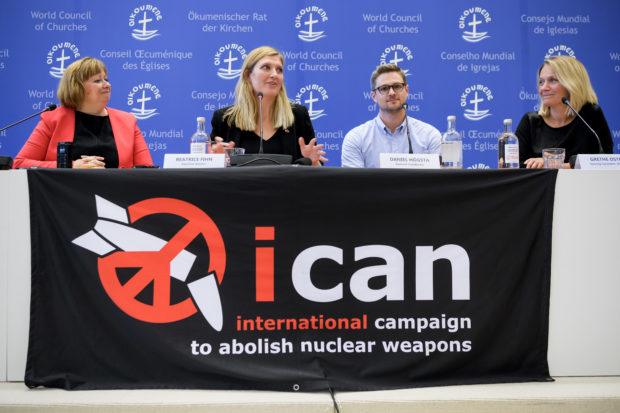
(From L) World Council of Churches (WCC) spokeswoman Marianne Ejdersten, Nuclear disarmament group International Campaign to Abolish Nuclear Weapons (ICAN) executive director Beatrice Fihn, ICAN coordinator Daniel Hogstan and ICAN member of the steering committee Grethe Ostern attend a press conference after ICAN won the Nobel Peace Prize for its decade-long campaign to rid the world of the atomic bomb as nuclear-fuelled crises swirl over North Korea and Iran, on October 6, 2017 in Geneva.
With the nuclear threat at its most acute in decades, the International Campaign to Abolish Nuclear Weapons, which on October 6 won the Nobel Peace Prize, is urgently pressing to consign the bomb to history. / AFP PHOTO / Fabrice COFFRINI
OSLO, Norway — The United States has issued a statement saying that “no state possessing nuclear weapons or which depends upon such weapons for its security supports” a U.N. treaty to prohibit nuclear weapons.
The statement came after the 2017 Nobel Peace Prize was awarded Friday to the International Campaign to Abolish Nuclear Weapons.
In its statement, the U.S. said “today’s announcement does not change the U.S. position on the treaty: the United States does not support and will not sign the treaty.”
The U.S. said it is “seeing a deterioration in the overall security environment and growing nuclear capabilities of certain states. This treaty will not make the world more peaceful, will not result in the elimination of a single nuclear weapon, and will not enhance any state’s security.”
It said the treaty “risks undermining existing efforts to address global proliferation and security challenges.” It promised to work with other nations to improve international security, counter nuclear proliferation and reduce nuclear dangers.
U.N. Secretary-General Antonio Guterres has tweeted his congratulations to the International Campaign to Abolish Nuclear Weapons, saying: “Now more than ever we need a world without nuclear weapons.”
His spokesman Stephane Dujarric said Friday that “events over the past months have reminded us of the catastrophic risk that nuclear weapons pose to humanity.”
This was a clear reference to North Korea’s increasingly sophisticated nuclear and ballistic missile tests and the threatening exchanges between U.S. President Donald Trump and the North’s leader, Kim Jong Un.
Dujarric says “at a time when nuclear anxieties are at the highest level since the Cold War, the secretary-general calls on all countries to show vision and greater commitment for a world free of nuclear weapons.”
Former Soviet Union leader Mikhail Gorbachev has hailed the awarding of the Nobel Peace Prize to a group campaigning against nuclear weapons, saying it reinforces the position that he and Ronald Reagan took at the Reykjavik summit a generation ago.
Gorbachev, who has himself campaigned against nuclear weapons since leaving office in 1991, said he was “very worried that military doctrines again allow the use of nuclear weapons.
He added in a statement: “I would like to remind about a joint statement we signed with Ronald Reagan: A nuclear war can’t be won and must never be fought.”
Although the 1986 Reykjavik meeting collapsed at the last minute, it led to the 1987 Intermediate-Range Nuclear Forces treaty that banned all land-based cruise and ballistic missiles with a range between 500 and 5,500 kilometers (310 and 3,410 miles).